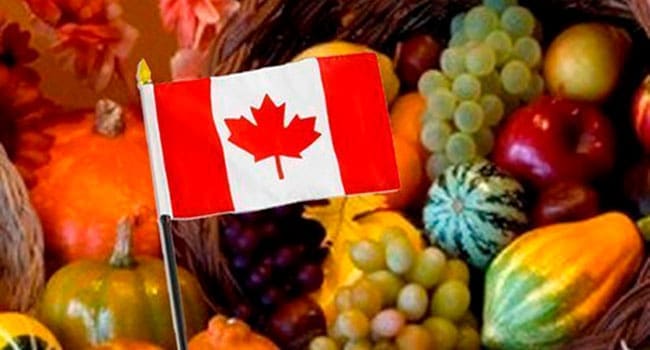 Canadians just finished celebrating Thanksgiving.
Canadians just finished celebrating Thanksgiving.
Their turkeys, beef roasts, hams or other dishes were cooked with great care. An abundance of side dishes, including stuffing, mashed potatoes, steamed vegetables and cranberry sauce, were laid out. Some had a pumpkin pie for dessert and watched the Canadian Football League’s Thanksgiving Day Classic between the Edmonton Eskimos and Montreal Alouettes.
During this time, we gave thanks for our families, friends, neighbours … um, beer … back bacon … P.K. Subban … Gordon Lightfoot … snow – well, maybe not the last one.
Wait a minute. Why do we celebrate Thanksgiving in Canada?
It’s a question my American and international friends and colleagues have regularly asked over the years. They know that U.S. Thanksgiving is always celebrated on the fourth Thursday in November. They’re mostly aware of the history behind the first Thanksgiving, a three-day feast by the Pilgrims and Indigenous Americans to celebrate the former’s first harvest in the New World that may have begun as early as 1619. They may even be aware of President Abraham Lincoln’s Oct. 3, 1863, Thanksgiving Day Proclamation, in which it was permanently designated a national holiday.
They also know about the National Football League’s three Thanksgiving Day games, two of which are hosted by the Detroit Lions and Dallas Cowboys. (If they don’t, they should.)
Canadian Thanksgiving, on the other hand, may seem more like the holiday that wasn’t.
In fact, Canadian Thanksgiving may not have the reputation of American Thanksgiving, but it has a certain amount of historical significance.
The first Thanksgiving was reportedly celebrated in Newfoundland on May 27, 1578. British explorer Sir Martin Frobisher and his brave crew, who fought high waters and horrible weather to arrive at their destination, celebrated communion and gave thanks to God. The meal consisted of salt beef, biscuits and mushy peas.
There’s also the Ordre de Bon Temps (Order of Good Cheer), a series of rotating feasts held in Port-Royal, N.S., in November 1606. This was the brainchild of the great French explorer Samuel de Champlain to help prevent a repeat of the awful scurvy attack that left 36 of 80 French settlers dead at Ile Sainte-Croix in 1604 and 1605.
Marc Lescarbot, an Acadian lawyer who attended the feasts, wrote about it in his 1609 book, Histoire de la Nouvelle-France. He described the festivities as “a feast, a discharge of musketry, and as much noise as could be made by some 50 men, joined by a few Indians, whose families served as spectators.”
The Province of Canada – then a British colony – officially celebrated the first Thanksgiving on Nov. 3, 1859. The first Thanksgiving after Confederation, which was a civic holiday, occurred on April 5, 1872. And Canadian Parliament first designated Thanksgiving as a national holiday on Nov. 6, 1879.
This annual celebration in the Great White North has only had a permanent spot on the calendar for 60 years. Gov. Gen. Vincent Massey proclaimed on Jan. 31, 1957, that “A Day of General Thanksgiving to Almighty God for the bountiful harvest with which Canada has been blessed – to be observed on the second Monday in October.”
Massey’s proclamation wasn’t cheered by all Canadians. E.C. Drury, former United Farmers of Ontario leader who served as premier from 1919 to 1923, said “the farmers’ own holiday has been stolen by the towns.”
In time, these trivial tensions disappeared and the entire nation accepted this holiday with gratitude and thanks.
Plenty of debate among Canadian and American historians remains as to whether these Canadian-based historical events really constitute the creation of Thanksgiving.
At the very least, let’s call them early dry runs that ultimately led to significant North American-based celebrations. With turkey and football to boot, eh?
Michael Taube, a Troy Media syndicated columnist and Washington Times contributor, was a speechwriter for former prime minister Stephen Harper. He holds a master’s degree in comparative politics from the London School of Economics.
The views, opinions and positions expressed by columnists and contributors are the author’s alone. They do not inherently or expressly reflect the views, opinions and/or positions of our publication.

